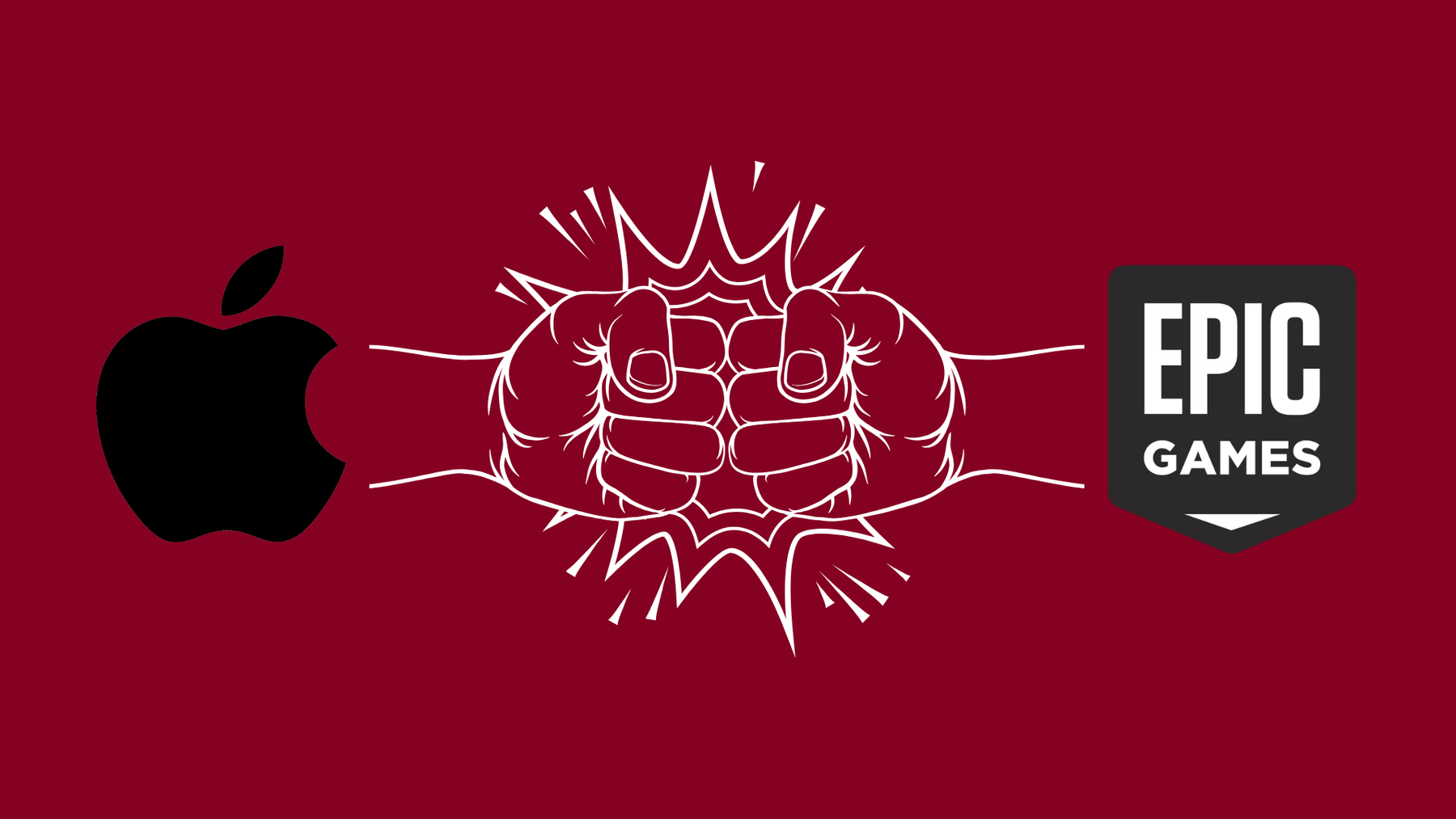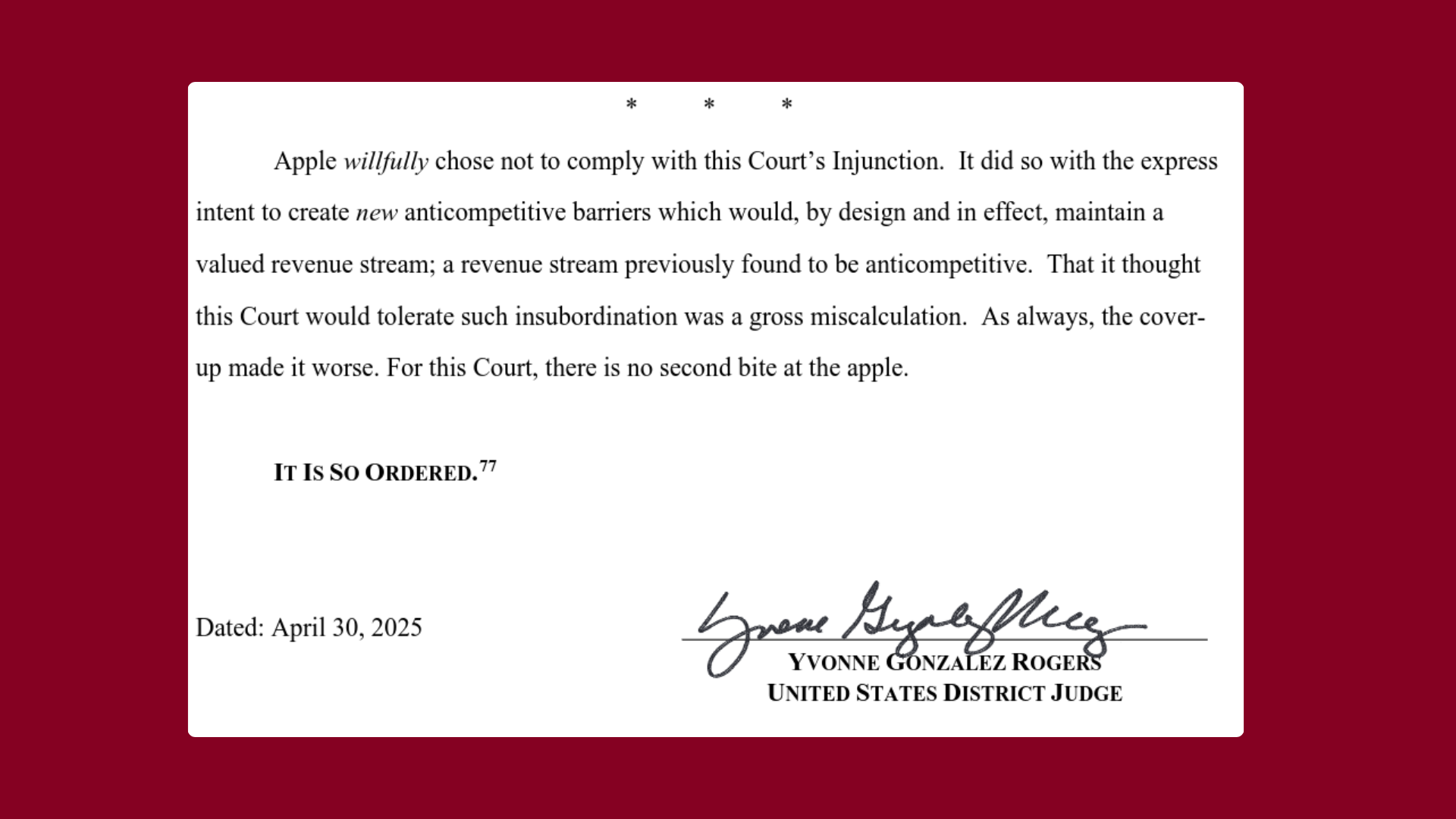Busted: Apple lied to protect its monopoly.
Apple lied, you paid: US antitrust ruling states that Apple must stop taking a 30% cut on sales outside the App Store immediately.
In a decision last week, US judge Rogers prohibits Apple from charging fees for purchases outside the App Store with immediate effect. The judge also prohibits Apple from limiting how developers can direct users out of the iOS app in order to make purchases elsewhere, e.g. in the web app.
The ruling was made as part of an ongoing legal dispute between Epic Games vs. Apple. The judge also accuses Apple of having purposefully disregarded her earlier decision from 2021. She described Apple’s decision as a gross miscalculation and referred the case to the US Attorney’s Office for consideration of possible criminal consequences.
US antitrust ruling
The US antitrust ruling by judge Rogers states that Apple:
- May not charge “any commission or any fee on purchases that consumers make outside an app”
- May not restrict developers’ when they want to place links for purchases outside of an app, including no restriction of call to action banners
- May only show “a neutral message apprising users that they are going to a third-party site”
This landmark ruling makes clear that Apple lied under oath, ignored court orders, and unfairly charged iOS users - all to maintain its illegal monopoly.
Apple monopoly
Apple’s monopoly centers around its unique position as it combines its hardware sales (iPhones, iPads, iMacs) with in-app sales. While Google always allowed other app stores as well (for instance, F-Droid, which is a great alternative!) - even though, yes, Google also holds a monopoly, one on search -, Apple has never allowed third-party app stores for iOS claiming this was about better “security”. The way Apple is now fighting to protect its monopoly rather shows, it’s all about the money, money, money.
These antitrust legal battles do not only happen in the US. The EU has recently published the Digital Markets Act (DMA) and the EU Commission ruled in April 2025 that Apple breached the DMA and issued a fine of €500M. This should, however, only be the first step because developers have repeatedly called out Apple for malicious “compliance” with the DMA, still making it way too difficult and too expensive for app developers to allow app sideloading on iOS.
Another example of Apple’s power is how it denied us, Tuta Mail, to enable the Tuta email app as default mail app on iOS. Because of this we filed a complaint based on the DMA. Within days of making this public, Apple got in touch with us, and now we are able to integrate this functionality, which is highly requested by our users.
So while Apple is showing first signs of trying to comply with the DMA, for instance by allowing you to choose your default browser on iPhones, it definitely is not doing enough.
Apple’s monopoly enables the company not only to dominate the market, but only to charge illegal fees from app developers and/or consumers. It’s good that antitrust departments in the US and Europe are finally scrutinizing this, trying to limit Apple’s seemingly endless power.
Legal battle: Epic Games vs. Apple


Epic Games vs. Apple
Key events
In August 2020, Epic Games introduced a direct payment option in Fortnite on iOS, bypassing Apple’s 30% App Store commission. Apple responded by removing Fortnite from the App Store.
Epic sued Apple, alleging that Apple’s control over the App Store and Apple’s in-app payment system was monopolistic and violated U.S. antitrust laws.
Apple sued as well, arguing that Epic breached its developer agreement.
Legal arguments
Epic’s Claim: Apple holds a monopoly over app distribution and payment processing on iOS, which stifles competition and harms developers and consumers.
Apple’s defense: Its App Store policies ensure user safety and privacy, and its 30% commission is industry standard.
Court rulings
September 2021
Judge Yvonne Gonzalez Rogers of a U.S. District Court ruled that
-
Apple must allow developers to link to alternative payment methods (a win for Epic).
-
Apple was not guilty as charged in nine of ten counts, for instance it was not found to be a monopoly under federal antitrust law (a win for Apple).
-
Epic was also ordered to pay damages for breaching its contract with Apple.
Both parties appealed parts of the ruling.
April 2023
The U.S. Ninth Circuit largely upheld the lower court’s ruling.
January 2024
The US Supreme Court denied both appeals which allowed Apple to restrict in-app purchases to its payment system, but also enabled app developers to include external links in their apps for alternative payment options (off-app).
April 2025
Apple “complied” with these rulings by allowing “off-app” purchases, but still requesting a 27% revenue share from app developers - even if consumers used alternate payment options. Apple also heavily restricted how the links to off-app purchases can be shown in the apps. Consequently, Epic filed a complaint that said that Apple’s actions were violating Rogers’ 2021 ruling. In April 2025 Rogers decided in favor of Epic Games ruling that Apple must stop charging fees for off-app purchases immediately.
Apple wants to appeal this ruling.
Broader impact
The fight Epic Games vs Apple has major implications for app store policies and the rights of app developers. It is part of a broader movement to limit the power of so called “gatekeepers” - large tech firms that can limit competitors within their systems - to achieve a level playing field for all tech companies, large and small.
Conclusion
Apple’s repeated claim that its strict App Store policies were about user safety and security has finally been exposed as to what it really is: a monopoly for profit protection. With both the EU and US calling out Apple’s “App Store Policy” as anticompetitive and illegal, the tide is finally turning - in favor of app developers and consumers.
This latest ruling confirms what developers and privacy-focused services like Tuta have long argued: Apple’s gatekeeping practices are not just unfair, they are unlawful. This is a huge win for making the internet a better place, one where privacy-first apps like Tuta have a fair chance against Big Tech giants such as Apple and Google.
But the battle isn’t over. Let’s keep fighting for our right to privacy - and for now, you can choose to Go European!


